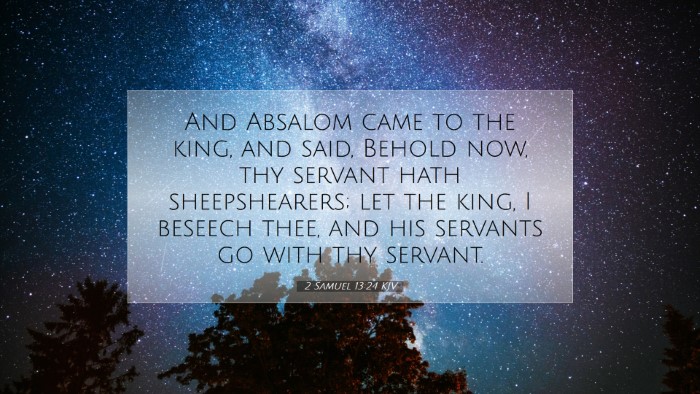Commentary on 2 Samuel 13:24
Verse Context: 2 Samuel 13:24 captures a critical moment in the narrative of King David’s family, highlighting themes of power, betrayal, and the consequences of sin. This verse occurs within the context of the tragic story of Amnon, Tamar, and Absalom, where the dynamics of familial relationships and moral choices lead to devastating outcomes.
Verse Analysis
“And Absalom came to the king, and said, ‘Behold now, your servant has sheep shearers; let the king and his servants go with your servant.’” (2 Samuel 13:24)
The Call to the King
Contextual Significance: The invitation extended by Absalom to King David can be viewed as a moment of duplicity, masked in brotherly camaraderie. While below the surface lies a carefully cultivated plan for revenge against Amnon, who has wronged Tamar.
Matthew Henry's Commentary: Henry suggests that Absalom's request was shrouded in the guise of celebration and familial duty. However, it starkly reflects his true intentions — a prelude to orchestrating Amnon’s murder. Absalom’s manipulative engagement with the king illustrates the moral decay within David’s house, showcasing a disconnect between familial loyalty and righteous living.
The Nature of Absalom's Request
Symbolism of Sheep Shearing: Sheep shearing in ancient Israel was a time of festivity, a celebration of abundance, and an occasion where communities gathered. Albert Barnes points out that Absalom’s choice of this event represents a façade of community and joy, masking the underlying malice he harbored. The request is laden with duality — a celebration of prosperity on the superficial level, while plotting revenge in obscurity.
- Sheep shearing symbolizes community gathering.
- Absalom's approach demonstrates his cunning nature.
- The invitation integrates deception with traditional norms.
Didactic Lessons
Adam Clarke’s Reflection: Clarke emphasizes the importance of discernment in leadership. Absalom’s skillful manipulation of David shows how leaders must be vigilant against treachery disguised as loyalty. The moral implications here serve as a warning against misplaced trust, especially among those within one’s inner circle.
Theological Implications
This passage serves as a profound examination of the human condition. Theologically, the events surrounding 2 Samuel 13:24 reflect the consequences of unchecked sin within a family and a broader community. The sins of David and the subsequent actions of his sons illustrate how generational sin can manifest into cycles of violence and retribution.
- Consequences of Sin: The tragedy here begins with Amnon’s sin against Tamar — an act of lust that leads to familial destruction.
- Cycle of Vengeance: Absalom's revenge is a critical pivot that illustrates how one sin leads to another, reflecting a deep moral breakdown.
- Divine Justice: Implicit in this narrative is the understanding of God’s judgment. The Lord had previously warned David of the repercussions of his actions, suggesting that familial strife was part of divine retribution.
Pastoral and Scholarly Reflections
The implications of this verse extend into pastoral care and theological inquiry. For pastors, this passage offers fertile ground for discussing the theme of reconciliation versus revenge in their congregational work. The dangers of harboring resentment and the destruction it invites can be thoughtfully explored.
For Scholars: The narrative complexity found in 2 Samuel 13 offers significant insights into the character studies of David, Absalom, and Amnon. The text invites scholarly discourse on moral failure and its systemic consequences within the narrative structure of the Hebrew Bible. Analyzing how each character reacts to sin, failure, and tragedy could foster discussions on character morality in biblical literature.
Conclusion
In conclusion, 2 Samuel 13:24 encapsulates pivotal themes relevant to pastors, students, and theologians alike. It exposes the intricate layers of human emotion, the perils of unchecked ambition, and the ramifications of sin that echo throughout familial and community relationships. The profound lessons gleaned from this scripture remind us of the constant need for vigilance, discernment, and the pursuit of righteousness in all interactions.


